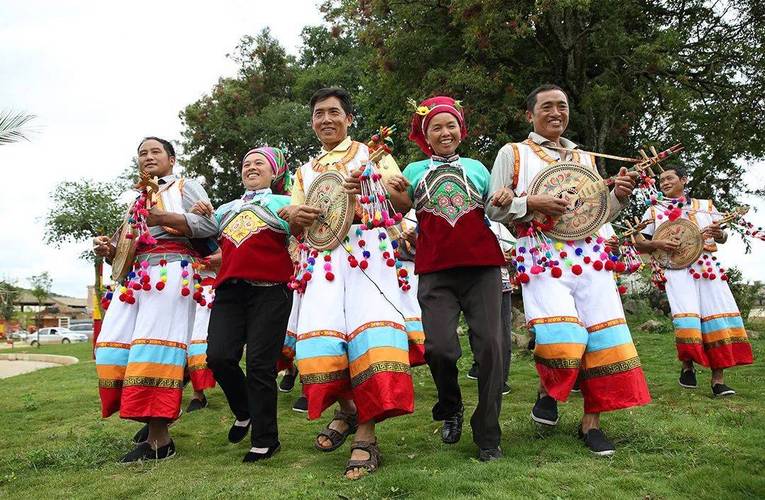
Mangshi Overview
Introduction
Mangshi, means “the City of Dawn” in Dai dialect, because it was right in the dawn when Buddha came to this city according to the legend. It is located in the southwest of Yunnan Province, it’s also the capital city of Dehong Prefecture. Mantshi is closed to Burma, thus it’s an important window for culture exchange between China and Burma and border port for trading and transportation. Mangshi is a classic national minority border city, so it has very thick and authentic national customs, plus its pretty landscape, it has nicknames, such as "the Hometown of Peacock" and "the City of Dawn". Local people also call Mangshi "Luxi".
Basic Information
- Chinese Name: 芒市
- English IPA: Mangshi
- Key Words: The capital of Dehong, the political center of Dehong
- Location: Located in the east of Dehong Autonomous Prefecture, southwest frontier of China, neighbouring Myanmar.
- Dailing Code: 0692
- Zip Code:678400
- Area: 2,987 square kilometers
- Population:410,400
- Language :Southwestern Mandarin, Yunnan Dialect, Dialect of Western Yunnan, Dai Dialect, Jingpo Dialect
History
Dehong is the important place for the southwestern Silk Road. In 122 BC, Zhang Qian went to the Western Region to find out the "Kingdom of Elephant", which refers to the present Dehong and parts of Myanmar. In 109 BC, Emperor Wudi of the Han Dynasty opened the southwestern Yi, and Dehong was Yizhou County. As a capital, Mangshi has an important position. Mangshi has a long history. Archaeologists have discovered Neolithic sites in Wuchalu Township and Zhongshan Township. The people of all ethnic groups lived on this land and wrote their long and glorious history.
Location
Manhshi is located in the southwest of Yunnan Province, and it’s also the capital city of Dehong Prefecture. Mantshi is closed to Burma, thus it’s an important window for culture exchange between China and Burma and border port for trading and transportation.
Transportation
Mangshi offers the convenient traffic including airport and 2 main bus station, without railway.There are main three bus stations and one airport in Mangshi. Different stations provides diverse lines. The Northern Bus Station is a station which provides the long-distance bus to other city in Yunnan. The Southern Bus Station offers the mini-bus to other counties and towns. The Three Trees includes the bus to Ruili city and Wanding.
Climate
Mangshi City enjoys a subtropical monsoonal climate without winter chills nor intense summer heat. It has long summer and short winter, and the weather is very mild in all seasons. Its annual average temperature is around 18-20℃ (64.4-68℉). The highest temperature is in June, the lowest in January. It has much rainfall in summer. The best time to visit Mangshi is from October to April of following year.
What to See
If you are tired of the hustle and bustle of metropolis, the tranquility and leisure of the small town must be your better choices. The City of Dawn, Mangshi, enjoys the gifts of nature and fulls of Buddhist atmosphere. Here, travelers can feel the strong belief of Buddhist through listening to the pray in pagoda, experience the life styles of ethnic minorities in ethnic villages and get involved in the picturesque scenery.
Local culture
Mangshi is a classic national minority border city, so it has very thick and authentic national customs, plus its pretty landscape, it has nicknames, such as "the Hometown of Peacock" and "the City of Dawn". Local people also call Mangshi "Luxi". The original inhabitants of Mangshi plain are mainly Dai ethnic minority, an ethnic minority with a long history and civilization. The men are gentle and kind, and the women are elegant and hardworking. The mountainous residents are mainly Jingpo people. This is a minority that migrated from the Qinghai-Tibet Plateau in ancient times. They are brave and unrestrained. In the pure land, diverse ethnic minorities live in peace and happiness. Otherwise,Mangshi enjoys the thick Buddhist flavor represented by the pagodas and temples of Dai. Most people in Mangshi believe in Hinayana Buddhism.
Administrative Division
Mangshi governs 1 street office, 5 towns, 5 townships, 1 ethnic township, 80 village committees, 13 residents committees, 719 natural villages, 1008 village (residential) groups; also administrates Zhefang Farm Committee (4 sub-fields, 31 production teams, 2 subordinate units).
Dining
The local people of Mangshi have their own traditional food and their own taste. The Dai people's diet is sour and refreshing, and the Jingpo people’ s are spicy. The tastes of the localities are mixed,renewed and integrated into the local taste of Mangshi.

 7 Days GolfingTour
7 Days GolfingTour
 8 Days Group Tour
8 Days Group Tour
 8 Days Yunnan Tour
8 Days Yunnan Tour
 7 Days Shangri La Hiking
7 Days Shangri La Hiking
 11 Days Yunnan Tour
11 Days Yunnan Tour
 6 Days Yuanyang Terraces
6 Days Yuanyang Terraces
 11 Days Yunnan Tour
11 Days Yunnan Tour
 8 Days South Yunnan
8 Days South Yunnan
 7 Days Tea Tour
7 Days Tea Tour
 8 Days Muslim Tour
8 Days Muslim Tour
 12 Days Self-Driving
12 Days Self-Driving
 4 Days Haba Climbing
4 Days Haba Climbing
 Tiger Leaping Gorge
Tiger Leaping Gorge
 Stone Forest
Stone Forest
 Yunnan-Tibet
Yunnan-Tibet
 Hani Rice Terraces
Hani Rice Terraces
 Kunming
Kunming
 Lijiang
Lijiang
 Shangri-la
Shangri-la
 Dali
Dali
 XishuangBanna
XishuangBanna
 Honghe
Honghe
 Kunming
Kunming
 Lijiang
Lijiang
 Shangri-la
Shangri-la
 Yuanyang Rice Terraces
Yuanyang Rice Terraces
 Nujiang
Nujiang
 XishuangBanna
XishuangBanna
 Spring City Golf
Spring City Golf
 Snow Mountain Golf
Snow Mountain Golf
 Stone Mountain Golf
Stone Mountain Golf





